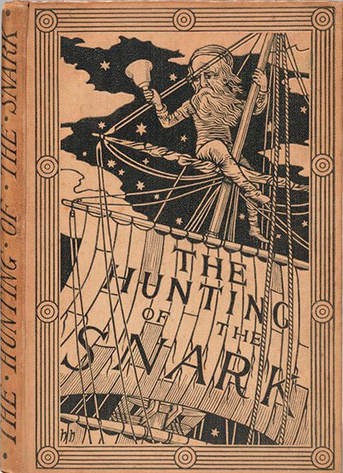 The first edition of Lewis Carroll’s "The Hunting of the Snark," March 1876. Illustration by Henry Holiday. The first edition of Lewis Carroll’s "The Hunting of the Snark," March 1876. Illustration by Henry Holiday. I never intended to stumble into a career as a writer and editor. I chose my college major based on which professors appeared to be the most entertaining or, perhaps I should say, the most inspiring. Although both my parents had been scientists, I loathed the idea of spending beautiful fall afternoons in dark, windowless labs. I decided, however, that I could spend those afternoons sitting under a tree reading a book. And so I did. I went to graduate school largely because someone—or rather some institution—offered to pay my way. And probably because I still had no idea whatsoever what to do with myself. So I spent two and a half more years studying literature and—much to my chagrin—philosophy and literary criticism. But, as I discovered only recently, it appears all I would have needed to do to become a clear, effective, and even amusing writer would have been to read the words my father left behind. I could have avoided all of that formal education if I had just pored over his publications. Reading academic papers about fragipans, tree throws, and surficial geology, however, wasn’t really my cup of tea. I knew that my dad’s colleagues had regularly praised the clarity of his writing, and he had demanded the same standard from his students. And I had seen glimpses of those practices, as well as his innate poetry and cleverness, in the two journals and the letters I had studied at some length to publish The Last Resort. But the other day I read three short book reviews my father had written in the early 1960s, which David Hoefer had unearthed in a search for all of my father’s publications. And I finally understood just what everyone had been talking about. In my favorite, my father references a Lewis Carroll poem to make a point about the author’s conclusions. David has now educated me about the seriousness of the book’s thesis in academic circles, but most of that flies blithely over my head. I have insufficient understanding of the content of the books my dad reviewed to embrace or reject the accuracy of his arguments. But I can evaluate his writing. In his review of the book The Upland Pine Forests of Nicaragua: A Study in Cultural Plant Geography by William M. Denevan, my dad remained unconvinced that Nicaraguan natives had used fire to manage the original forests despite Denevan’s repeated assertions, assertions that my dad felt lacked documented evidence. In wrapping up the review, he writes: "The aboriginal pyromaniac may indeed have produced the pine forests of Nicaragua, but Mr. Denevan does not convince me. I am reminded of Lewis Carroll's Bellman in The Hunting of the Snark: 'Just the place for a Snark! I have said it thrice: What I tell you three times is true.'" I was not familiar with this particular Lewis Carroll poem, although I now realize that his Jabberwocky is one of the few I have even partially memorized, thanks to Carroll’s books being omnipresent during my childhood. And his exposure of the inanity of repeating phrases of questionable veracity feels especially relevant today. Here are the first two stanzas of the poem: "Just the place for a Snark!" the Bellman cried, As he landed his crew with care; Supporting each man on the top of the tide By a finger entwined in his hair. "Just the place for a Snark! I have said it twice: That alone should encourage the crew. Just the place for a Snark! I have said it thrice: What I tell you three times is true." --The Poetry Foundation The book review my father penned appeared in Agricultural History, Vol. 36, No. 3 (Jul., 1962) and was indeed a serious academic critique of a work that remains relevant today. David Hoefer tells me that my dad’s skepticism, though perhaps a valid criticism at the time, has since been largely addressed as more evidence has been presented. But it was my dad’s introduction of a totally disparate text, a Lewis Carroll nonsense poem, to drive home a point that caught my attention—and made me chuckle. And that is the writer I want to be.
4 Comments
11/10/2018 11:58:34 am
More from the Snark for writers to learn: I think that "The Hunting of a Snark" shows to writers how important illustrations can be.
Reply
Sallie Showalter
11/11/2018 04:50:31 pm
Absolutely! Thanks for making that point. I am deeply indebted to designers and illustrators for improving the written word. Two examples related to The Last Resort: http://www.murkypress.com/blog/im-an-idiot and http://www.murkypress.com/blog/the-last-resortillustrated.
Reply
11/11/2018 05:46:24 pm
Yes. Alternatively to improve the written word, the function of illustrations also could be to complemtarily accompany the text and to help to interpret it: http://snrk.de/knight-letter-l
Sallie Showalter
11/11/2018 06:21:26 pm
Ah! Much better said. Thank you.
Reply
Your comment will be posted after it is approved.
Leave a Reply. |
Details
Archives
June 2023
Categories
All
|


 RSS Feed
RSS Feed